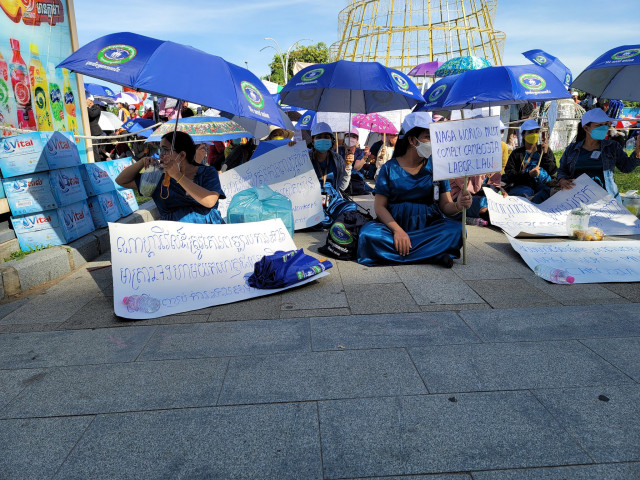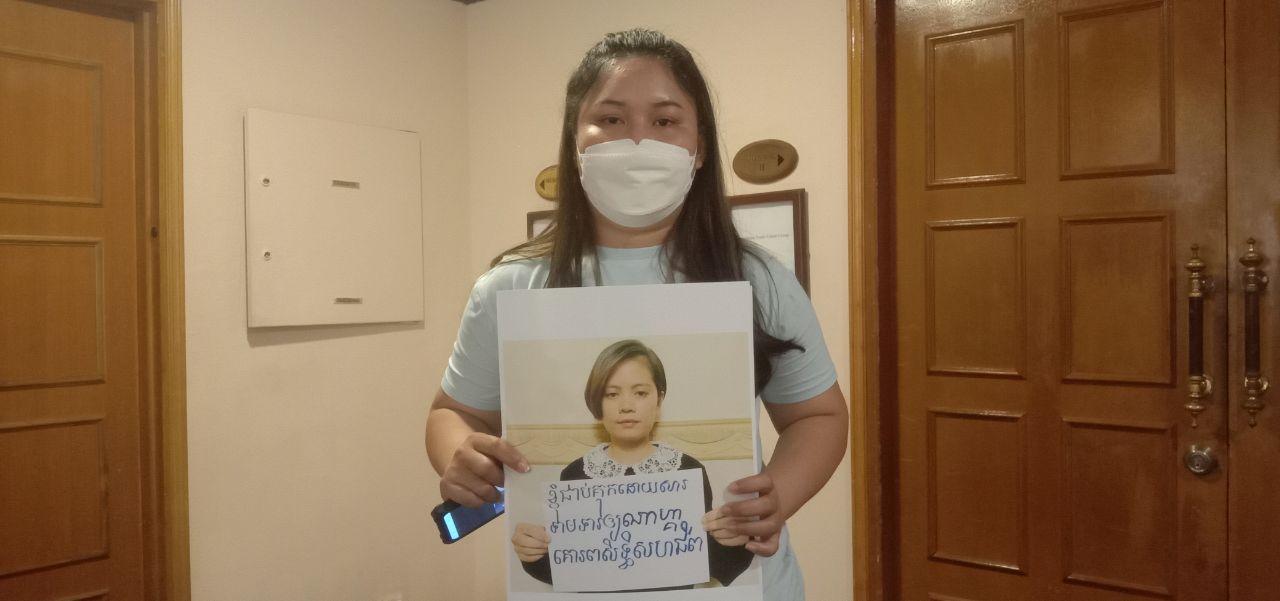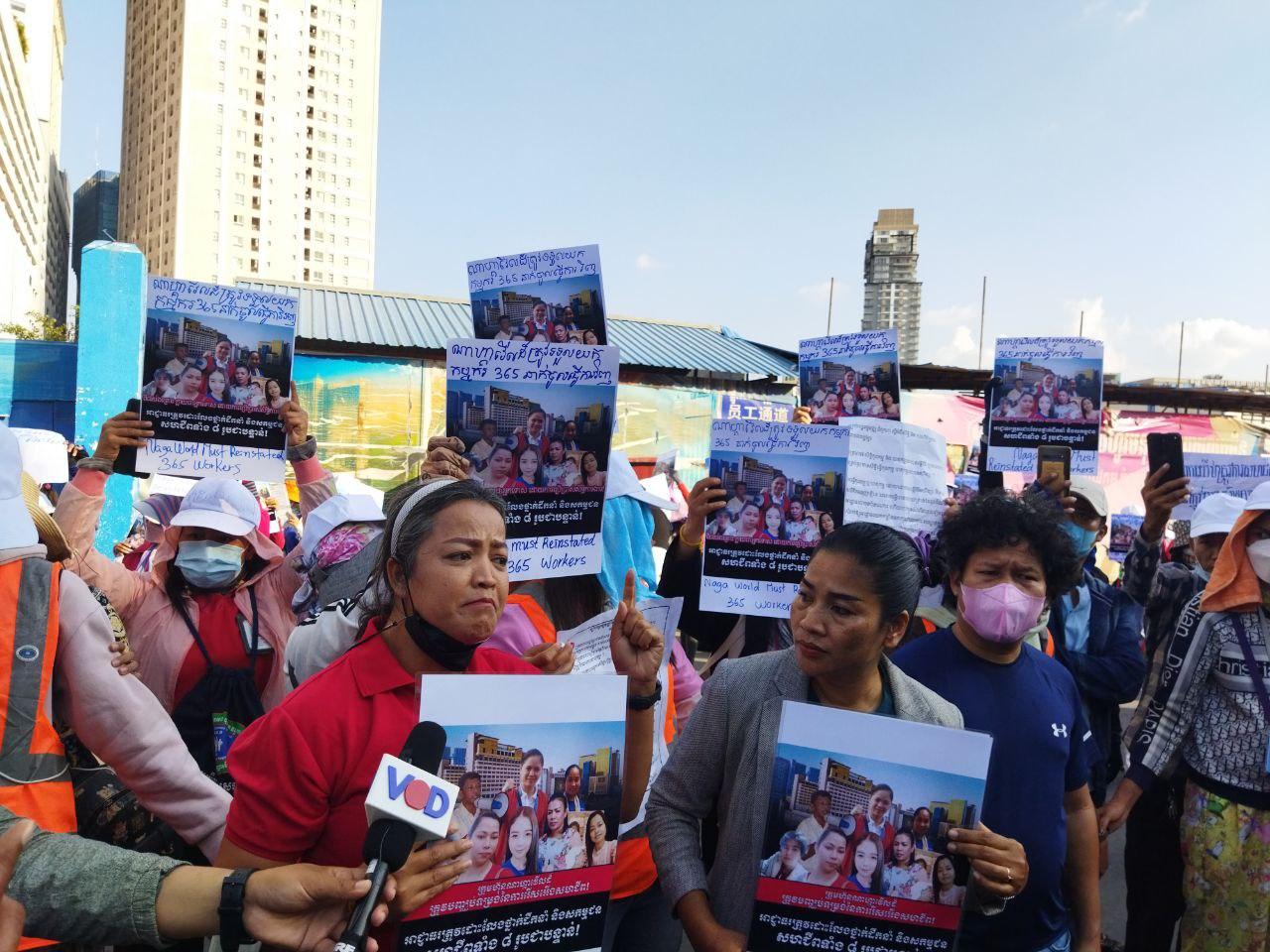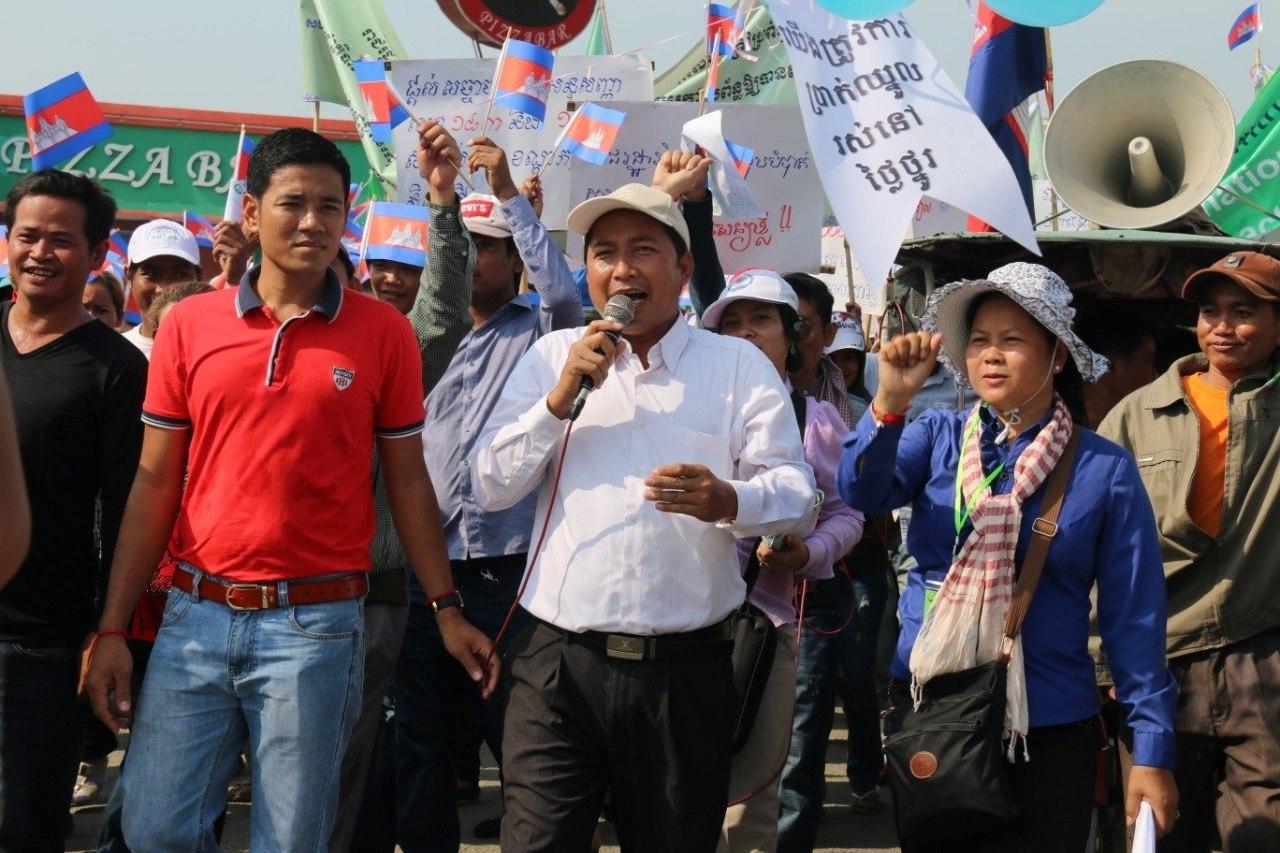Trade Unions: Women Workers Need Support During Pregnancy and Postpartum

- By Lay Sopheavotey
- and Phoung Vantha
- January 31, 2022 5:00 PM
Union leaders from several sectors report that employers often find ways around laws put in place to protect women’s rights in the workplace, and are asking for greater enforcement
PHNOM PENH--Union leaders are calling on the Cambodian government to carry out inspections and take measures against employers who fail to implement the laws protecting women workers during pregnancy, and this, especially in factories, the entertainment and construction sectors.
Their request comes at a time when pregnant women have participated in a strike at Phnom Penh’s NagaWorld casino where, they say, women employees who were pregnant were specifically targeted for layoffs in 2021.
Union leaders contend that, while laws exist to protect women, they have rarely been effective in practice and women continue to face discrimination. Many of them are fired when their employer discovers that they are pregnant and very few workplaces have bothered to set up nurseries, they say.
The Situation at NagaWorld
In the first half of 2021, a total of 1,329 NagaWorld employees were laid off by the company claiming to be affected by the COVID-19 crisis and having lost $77 million during the first six months of 2021.
However, during a press conference on Jan. 28, 2022, the employees who had been on strike for more than 40 days said that the company intended to eliminate union voices and continue discrimination against women. Most employees fired were women and 80 percent of those fired were members of the Labor Rights Supported Union of Khmer Employees of NagaWorld (LRSU), they said.
“I was pressured by a company that forbade me to get pregnant even though I was married: I worked with worries because I was worried about getting pregnant and afraid the company would fire me,” said Prum Rotana on Jan. 31. “For two years, sometimes I wanted to have a child, but could not because of [needing the] income.”
The 30-year-old woman, who had been an employee on probation, found herself among the workers laid off in 2021 and has joined those protesting NagaWorld’s employment practices.
According to NagaWorld worker Pov Reaksmey, the casino has been violating women's rights by basically prohibiting them to be pregnant.
Speaking at a press conference on Jan. 28, she said that, when she was hired, NagaWorld told her that, after a three-month probation period, she would become a full-time employee.

Three months later, the company said she would have to work one year before becoming a full-time employee, Reaksmey said. Then the terms were changed to three years. "As employees on probation…[the company] told us that we can only get pregnant after three years.
"If they know we are pregnant, they would tell [us] to resign," she said, adding that several of her colleagues had to resign due to pregnancy. And as she was told by her managers, workers on probation can be fired at any time.
Reaksmey then decided to become a member of the Labor Rights Supported Union of Khmer Employees of NagaWorld. When women employees on probation are union members, the casino management allows them to get pregnant but they do not receive any benefit, including the National Social Security Fund, she said.
"We want to work during pregnancy because we work for the company like other employees,” Reaksmey said. “Why can we not get pregnant and do not get support [benefits] at all?
“That's why we need unions to help protect our rights," she added.
NagaWorld, which has more than 7,000 employees, does not have a nursery for employees with young children, Reaksmey noted.
Attempts to get comments from NagaWorld on the casino’s policy regarding women employees and pregnancy were unsuccessful on Jan. 31.
Little or No Room for Pregnant Women in Some Sectors
Meanwhile, in the service and entertainment sector, trade union members said that it is rare to see pregnant women working because most business owners will not allow it.
Ou Tep Phallin, president of the Cambodian Food and Service Workers Federation, said that this was not only discriminatory, but also a motivating factor for women to quit their jobs or have abortions.
“Not that they do not want to have children, but these factors in life leave them only one choice,” she said on Jan. 14. “If they want to continue working, then they’re forced to have an abortion while other women choose to stop working.”

Xu Chhloun, vice president of the Building and Wood Workers Trade Union Federation of Cambodia, said that most female construction workers are fired by their employers during pregnancy.
In most cases, women workers quit when they get pregnant over concerns for their health but, in other cases, employers find ways to get rid of pregnant employees, he said on Jan. 26.
“When the boss finds out that workers are pregnant, they start thinking of finding an excuse to fire them,” Chhloun said. “This problem is due to employers avoiding responsibilities.”
Many employers and supervisors in the construction sector are already concealing the true number of staff on site and trying to reduce the company’s legal obligations, particularly in relation to the National Social Security Fund, he said. So pregnant women are easy targets, he added.
In a press release in April 2021, Oxfam said that approximately 90 percent of women in the labor force in Cambodia cannot access maternity protection benefits due to their informal status, and this includes those working in the construction and entertainment sectors.
Similar issues are harder to pin down in the garment sector, said Ath Thorn, president of the Cambodian Labor Confederation, who added that, while he did not have specific data, it was a common occurrence for women to be forced to resign so that factory owners would not need to support them through and after pregnancy.
“Some workers in small factories have been fired and some have not received protection from the National Social Security Fund because some factories hide employee data,” he said on Jan. 10. According to a 2019 report of the Ministry of Labour and Vocational Training, there were more than 700,000 workers in the garment industry, 70 percent of whom were women.
The Need for Childcare and Stronger Law Enforcement
In addition to problems during pregnancy, female workers also experience problems after childbirth, especially the lack of a day nursery providing childcare.
Both Xu Chhloun and Ou Tep Phallin said that neither the construction nor the entertainment sectors provide day nurseries, although Ath Thorn said that factories directly working with well-known brands are increasingly providing childcare options for their predominantly female workforce.

These issues once again highlight the gulf between Cambodia’s legislation and the practical implementation of the law. Article 46 of the Constitution states that it is prohibited to terminate a female employee due to pregnancy and that women have the right to maternity leave with paid wages along with seniority payments and other social benefits.
According to Article 182 of the Labor Law, it is prohibited for employers to dismiss women employees during childbirth, even by prior notice. In addition, workers are entitled to paid leave, weekly breaks, maternity leave, annual leave and special leave of no more than seven days.
Both the Labor Law and the Constitution make it clear that, in all enterprises, women have the right to maternity leave, for which the Labor Law sets three months for childbirth.
In addition to its own laws, Cambodia has signed several international conventions, including the Convention on the Elimination of All Forms of Discrimination against Women, the Convention on the Elimination of All Forms of Discrimination and the Convention on the Protection of the Motherland.
Women workers whose children are less than one year old are also entitled to one hour a day to breastfeed their babies. However in March 2021, a police officer in Stung Treng Province was initially reprimanded for breastfeeding her child while on duty and posting it on social media. An online backlash quickly saw the officer go from persecution to promotion.
Any business with 100 women employees or more must either set up a nursery or pay for their staff to find a nursery off-site, the Labor Law states in articles 185 and 186. But the union leaders interviewed all agreed that these laws rarely play out in practice.

Union Leaders: Requesting More Government Inspections, More Professionally Carried Out
This is why they are urging the government to put more effort into ensuring the law is enforced in relation to women’s rights in the workplace. The Ministry of Labour and Vocational Training in particular should do more thorough inspections and reprimand employers guilty of irregularities, they said.
Xu Chhloun, vice president of the Building and Wood Workers Trade Union Federation of Cambodia said that the Ministry of Labour’s reports are rarely disclosed and, on many construction sites, the authorities only visit supervisors or employers with workers unable to voice their concerns.
“We want the authorities and especially the Ministry of Labour to intensify its work to ensure the safety of staff,” he said on Jan. 26.
Ou Tep Phallin of the Cambodian Food and Service Workers Federation also said that government inaction has allowed employers to get away with not meeting their legal obligations to employees. She emphasized that the non-fulfillment of these obligations is often due to corruption, with rich business owners paying their way through inspections.
“Some officials did not inspect the entertainment venues at night because they said it was too late for work duties and the authorities did not dare check some [of them] because the big entertainment venues are all run by powerful people, rich people,” she said. “This proves the inaction of law enforcement continues.”
Union leaders called on the government to go beyond issuing laws, adding that proper enforcement was needed if gender inequality is to be reduced in Cambodia.
While Dispute Resolutions and Workplace Inspections Were Delayed Due to the Pandemic, Ministry of Labour Officials Say Workers Can Refuse Some Work Environment or Conditions
Asked about the union leaders’ requests for more government oversight, Hong Nareth, director of the Labor Inspection and Dispute Office at the Ministry of Labour and Vocational Training, said on Jan. 31 that inspections and labor dispute resolutions had been delayed in 2021 due to the COVID-19 pandemic.
Heng Sour, spokesman for the Ministry of Labour, said that, in general, pregnant women are respected in the workplace.
Work environments such as those where there are chemicals or other conditions that could be harmful to future mothers and babies may require separate work agreements, he said on Jan. 31.
"The enterprise can shift the workplace of women who are pregnant from a high-risk part to a safe workplace without terminating contracts or firing them,” he said. “If [they] fire them, [an employer may] have to pay a lot of compensation and other compensations."
In any case, companies will explain the working conditions or sign an employment contract with the employee before he or she starts working so that workers can reject such conditions if they do not agree, Sour added.
"If there is a complaint before the contract [is signed], the Labor Inspectorate can inspect and advise the worker whether to refuse such work," he said.
Asked about former NagaWorld women employees saying that they had been told not to get pregnant while working at the casino, Sour said that the Ministry of Labour had not received complaints to that effect from women employees at the casino before they had signed their contracts.















